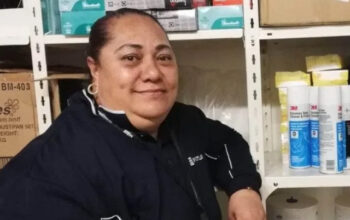 Her journey began after finishing college and moving to Auckland in 1987. Mele began working straight away, to help support her family back in Tonga. At one stage she was balancing three jobs: mornings at a Ponsonby fashion store, evenings assisting nursing staff at a North Shore rest home, and weekends cleaning at a motel.
Her journey began after finishing college and moving to Auckland in 1987. Mele began working straight away, to help support her family back in Tonga. At one stage she was balancing three jobs: mornings at a Ponsonby fashion store, evenings assisting nursing staff at a North Shore rest home, and weekends cleaning at a motel.
Mele’s role at Papertree Fashion was where she learned the value of excellent leadership. “I was the youngest in the workplace, so I worked closely with the supervisor, who taught me everything.”
She then became a sewer for fashion businesses before relocating to Wellington and working in childcare. After getting married and having her own children, she returned to cleaning and started an afternoon role at a local school. “I love learning new things, but my heart is in cleaning.”
As Mele’s children grew up, they would accompany her to work. “At 3pm, I would take them with me to the school and for over 10 years, we worked together – one would do the rubbish, the other the vacuuming, and so on – it’s fun when you do it with your own family. The kids became really good at it and knew exactly what to do, from a young age.”
Mele is currently site supervisor at both MBIE and WelTec in Wellington. Her husband Mohenoa is a welder and after 25 years, joined her in the cleaning industry. Their six children are now aged between 21 and 31, and some also clean with Mele part time, to pay for university. “My husband and I go everywhere together now and see each other much more. Cleaning offers great flexibility for families.”
In 2004, Mele joined the E tū Industry Council, advocating for the rights of cleaners in New Zealand, including the Living Wage. She regularly travels to Australia and other countries to represent the union. “I see and understand the struggles of cleaners and how important the role is.”
Her motivation comes from wanting to help people. “I don’t fight for myself; I fight for my brothers and sisters in the industry. My children and grandchildren are the future of this country. I’m fighting for tomorrow, and the next generation will suffer if we don’t fight now.”
Mele has been interviewed by television media and has stood before national leaders, challenging them about wage disparities. “I’ve told John Key to get ready to clean his own office, and asked Bill English how he pays his house cleaner $25 an hour, so why can’t all professional cleaners get the same?”
She also helped set the NZQA unit standards for cleaning, has trained to be an educator and says the practical is just as important as qualifications. She enjoys training staff and working with different nationalities. “We have a real mix of cultures here, including people from Samoa, Tonga, the Philippines, Cambodia, Africa and India. I love it. We share stories of our lives and struggles growing up, and we support and inspire each other.”
The key attributes for a successful career in cleaning are patience, a willingness to learn and reliability; and she says it’s a stress-free job if you’re doing it correctly. “You go to work, then go home and don’t think about it, because no one is micromanaging you. If you do your job properly and consistently, you have no worries.”